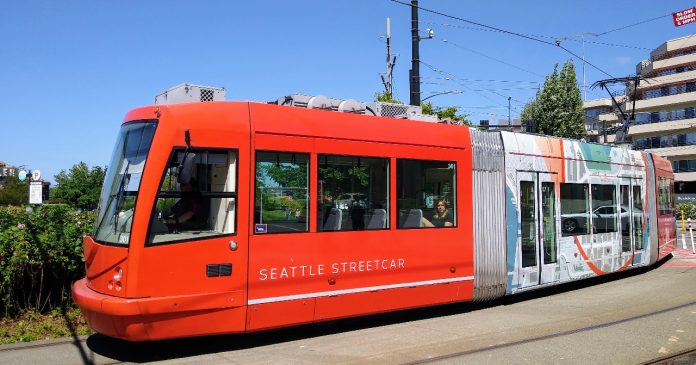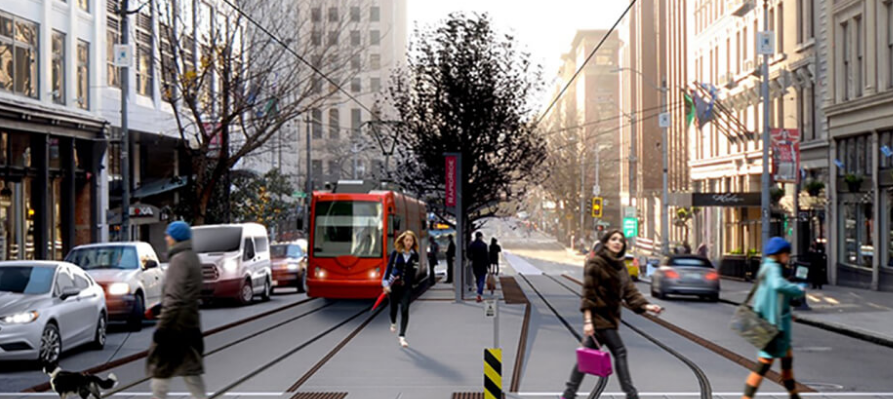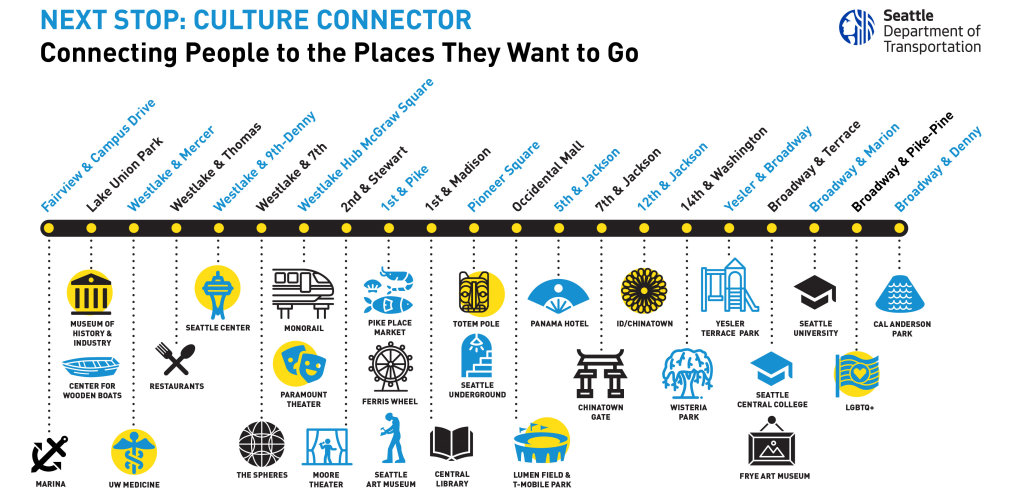
The City of Seattle will be required to return two sizable federal grants, both of which had already been awarded to fund the long-planned Center City streetcar extension between the city’s two disconnected streetcar lines, if a local match isn’t provided in the next few weeks to be able to advance the project. This news comes just as the Seattle City Council begins to consider amendments to Mayor Bruce Harrell’s proposed budget for next year, which currently doesn’t include any funding for the project, rebranded the Cultural Connector.
The two grants, each around $3.5 million dollars and both applied for under the U.S. Department of Transportation’s Congestion Mitigation and Air Quality (CMAQ) Improvement Program, had originally been intended for use for acquisition of new streetcar vehicles, but their timelines had been extended as Seattle delayed moving forward with the project. Another extension isn’t likely. The Puget Sound Regional Council (PSRC), which administers federal grants like this across the four-county central Puget Sound, confirmed that a local match would be required this fall in order for the City to keep the funds secured.
“If the city reports in December that the funds are not reasonably secured to meet the March obligation deadline, the grant funding would need to be returned,” Kelly McGourty, PSRC’s director of transportation planning, told The Urbanist. “Federal and state rules require demonstration that the phase(s) awarded grant funding must be fully funded — so we are not allowed to award funds without reasonable expectation that all funds necessary to complete the phase in question will be available within the time specified.”

Another larger $75 million Small Starts grant, administered directly by the Federal Transit Administration (FTA), remains available for the project if the city is able to move forward, with the FTA continuing to rate the project very highly, based on an expected 6.3 million annual trips heading through downtown on the streetcar by 2035.
At least one councilmember is interested in trying to retain these two smaller grants by advancing some design funding in the coming weeks.”
“We need to make sure that we are remaining competitive to keep these federal grants,” Councilmember Andrew Lewis, who represents District 7 where the streetcar would be built, told The Urbanist. “And I support making sure that we take budget action this year to not turn this money away, and that means moving forward with these plans to see if the streetcar is a viable project, with the support from our federal partners.”
But streetcar funding was not included in an initial “balancing package” proposed by budget chair Teresa Mosqueda this past Friday, and adding the funds back in is likely going to be an uphill battle, with a sizable continent of the council strongly opposed to any streetcar spending.
The streetcar project, nearly a decade old at this point, has essentially been on hold since 2018, after questions arose about design elements. The Durkan administration cited concerns about the length of planned new vehicles that might have been out-of-alignment with plans to expand the streetcar’s operations and maintenance facilities, as well as the overall cost of the project. An independent review conducted by KPMG found the project would cost $252 million, an increase of around $50 million compared to previous estimates. That total amount at the time included $31 million that had already been spent by the City. By 2019, that cost had increased again to $285 million.
Current costs are likely higher still given recent cost increases across the entire transportation sector, but an exact number isn’t yet known. Another consultant’s report commissioned by SDOT updating assumptions around the project is due to be released in the coming weeks, but that report may come too late to influence deliberations on this year’s budget.
The fact that the project has even gotten this far reflects a certain amount of support within city government. After the project had been held at arm’s length by the Durkan administration, the streetcar extension was embraced by the Harrell administration as part of a focus on downtown revitalization and activation. The name change to Cultural Connector highlighted the amenities along the full route once the two existing lines could be connected via First Avenue.

But recently, voices against the project have become louder than those supporting it. Groups inside Pike Place Market have started to raise concerns about impacts on businesses at the Market during a long construction period, and plans to remove loading spaces along First Avenue have long rustled feathers inside the historic district. Last week, the 36th District Democrats was the latest group to ask the city to not move forward with the project, via a resolution introduced by longtime activist Jack Whisner, who is a transit planner at King County Metro but not officially representing the agency on this matter.
That resolution called for bus service to be added to First Avenue instead, something that King County Metro is not currently proposing. Furthermore, if buses were to be given dedicated space along the street, as is proposed with the Cultural Connector, curbside parking would likely be required to be removed as well, another point raised in opposition to the streetcar.
The mid-year update to the 2023 budget had proposed $1 million in city funds for the next phase of design, but a committee vote in early August pulled that funding out. Just three city councilmembers — Lisa Herbold, Alex Pedersen, and Sara Nelson — approved stripping out that funding, and no amendment was brought back to restore it when the proposal went to the full council. All nine councilmembers have not yet had a chance to weigh in. At the time, both Herbold and Nelson said that it wasn’t appropriate to have the conversation about getting the project going again during the mid-year update to the budget. But it’s not clear that the conversation will be had this fall, either.
The city council funded continued streetcar study in 2019 by a 6-1 margin, but Councilmember Kshama Sawant ducked that vote, so it’s uncertain that she would support the streetcar this time around when her vote may be needed. Likewise, Council President Debora Juarez often votes with Pedersen and Nelson, who may be able to swing her vote this time around. Herbold, Pedersen, Juarez, and Sawant are retiring this year, but it could be they are intent on throwing away federal grants and tying the hands of their successors when it comes to the streetcar. The field to replace the four retiring members is entirely composed of pro-streetcar candidates — at least according to responses to The Urbanist’s questionnaire.
Earlier this month, during a presentation on the entirety of SDOT’s proposed budget for next year, options presented by the City Council’s independent staff around how to move forward with the Cultural Connector included adding restrictions on whether the Harrell administration can spend any money on the project, and even full removal of the project from the City’s Capital Improvement Plan, a step that would all but signal that the project is dead. Adding in the necessary funding for design work to be able to retain these grants was not included on the options list, making things look very bleak for the project.
Losing this $7.3 million that had already been secured could make it that much harder for a new city council to move forward with the project at all.
Ryan Packer has been writing for The Urbanist since 2015, and currently reports full-time as Contributing Editor. Their beats are transportation, land use, public space, traffic safety, and obscure community meetings. Packer has also reported for other regional outlets including BikePortland, Seattle Met, and PubliCola. They live in the Capitol Hill neighborhood of Seattle.

